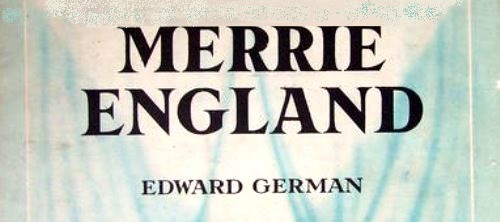Merrie England is an English comic opera in two acts by Edward German to a libretto by Basil Hood. The patriotic story concerns love and rivalries at the court of Queen Elizabeth I, when a love letter sent by Sir Walter Raleigh to one of Queen Elizabeth’s Ladies in Waiting, Bessie Throckmorton, ends up in the hands of the queen. Well-known songs from the opera include "O Peaceful England", "The Yeomen of England" and "Dan Cupid hath a Garden".
Two versions of the plot exist: Hood's original from 1902 and a revised one by Dennis Arundell presented at Sadler's Wells in 1960. The opera is set in Windsor Town and makes frequent reference to mythology and folklore (Robin Hood, King Neptune, St. George and the Dragon and witchcraft).
Act I
During the May Day festival, the May Queen is crowned with "roses white and roses red ... the flowers of Merrie England". Her two guards are introduced – Long Tom and Big Ben – who are brothers identical in all but one thing. The "little difference between them" is that Big Ben (like the other men in Windsor) loves the May Queen, while Long Tom loves Jill (known as Jill-All-Alone). Jill is accused of being a witch by the jealous May Queen and is shunned by the townsfolk.
Bessie Throckmorton, one of Queen Elizabeth's Ladies in Waiting, and Sir Walter Raleigh are in love, but they must keep their love a secret as the queen is also in love with Raleigh. Bessie tells of how she carelessly lost a love letter from Raleigh ("She lost the letter from her love"). She worries that the letter may have fallen into Queen Elizabeth's hands and thus reveal their secret love. The Earl of Essex (Raleigh's rival for the affection of the Queen) is handed the love letter (an acrostic on the name Bessie) by Jill-All-Alone and plans to use it to dispose of Raleigh. Walter Wilkins, a travelling actor, appears and argues that any play can be vastly improved by the addition of song ("if it's played on a big brass band") and claims that "that's where [he] and Shakespeare disagree."
Queen Elizabeth enters with much ceremony. Long Tom pleads for the queen's protection of Jill-All-Alone from the townsfolk's persecution. The queen asks Jill whether she believes she is a witch. Jill replies with the paradox that if she were a witch, she would know more than the townfolk, therefore she can't be a witch, as she would know (as the townsfolk seem to) that she is a witch if she were. She declares that love will pass the queen by. This insult angers the Queen, who joins with the villagers in condemning Jill as a witch, locking her away in the Tower of London for witchcraft. Essex hands the Queen Raleigh's love letter, which she initially mistakes to be meant for her. Raleigh gallantly admits that the letter is in fact meant for Bessie Throckmorton. The Queen is so incensed that she banishes Raleigh from Court and imprisons Bessie in Windsor Castle.
Act II
Jill has managed to escape with Bessie using a secret passage out of the tower. The Queen asks an apothecary (her jester in disguise) to concoct a poison which she will administer to Bessie.
Wilkins works at length on a stage version of the story of St. George and the Dragon, and the play is performed for the Queen and Essex. Unfortunately, they dislike the play.
Eventually the Queen is persuaded to allow Raleigh and Bessie to love each other freely, choosing Essex instead for herself after seeing an apparition of Herne the Hunter, who, according to legend, appears only when a sovereign contemplates a crime. The whole court takes part in a reenactment of Robin Hood's wedding to Maid Marian. Everyone takes roles closely related to their part in the opera; for example, Raleigh becomes Robin to Bessie's Marian.

.png)
.png)





